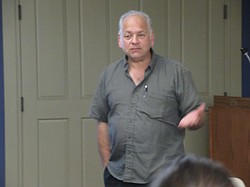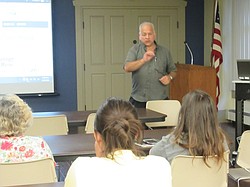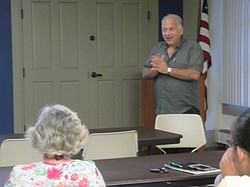Neighbors | Jessica Harker .On August 8 librarian Tim Seman taught community members about the importance of cemeteries and how the public view of them has changed at the Boardman library.
Neighbors | Jessica Harker .Librarian Tim Seman taught community members about the history of cemeteries August 8 at the Boardman library.
Neighbors | Jessica Harker .About 10 community members gathered at the Boardman library August 8 for librarian Tim Seman's lecture on the future of cemeteries.
By JESSICA HARKER
Librarian Tim Seman hosted an event detailing the history and future of cemeteries on Aug. 8 at the Boardman library.
Seman said he hosts the lecture once per year, and usually plans to cover it around October due to the nature of the topic.
“They are a place for contemplation,” Seman said. “We learn about the living by walking among the dead.”
During the event, Seman discussed the history of cemeteries, how they moved from church yards to outside community limits due to spacing issues.
“What that change gave birth to was that cemeteries could be places that are not just for the burial of the dead but for the community, for the living,” Seman said.
He explained that today cemeteries are used as places that the community can enjoy.
“It is a place where people will go and make momentous life decisions,” Seman said.
He explained that many people go to cemeteries to contemplate changes in life, to propose marriage, to enjoy being with family and enjoy nature and architecture. Along with the benefits to the community, Seman said that cemeteries are a gold mine to genealogists. He said that genealogists are able to discover information from head stones and cemetery offices, as well as offering the potential of discovering an unknown relative.
“Cemeteries can also struggle to survive,” Seman said. “It’s a business and as a business it can struggle to maintain itself.”
He said that cleaning and maintenance of the cemeteries can be expensive, and when the cemetery can no longer afford the care there is the question of what should be done.
Because of these issues, and the public’s changing relationship with the dead, Seman also talked about what the future of cemeteries might be.
“In five generations we have no idea how people will think about death and cemeteries, we have no idea what will happen,” Seman said.
For more information on upcoming library events, go to www.libraryvisit.org.
 43
43



